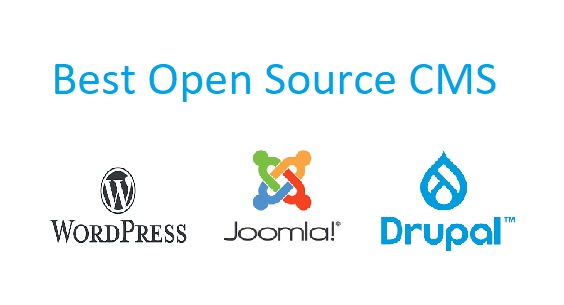In today’s digital landscape, having a well-designed and functional website is crucial for success. Content Management Systems (CMS) play a vital role in managing and presenting content effectively. One popular choice is Open Source CMS, providing various options for website development. This article will guide you on how to choose the right Open Source CMS for your website.

What is an Open Source CMS?
An Open Source CMS is a content management system whose source code is freely available to the public, encouraging collaboration and community-driven development. These CMS platforms allow users to create, modify, and manage digital content without requiring extensive technical knowledge.
Advantages of Open Source CMS
Open Source CMS platforms offer several advantages, making them a compelling choice for many website owners:
Flexibility and Customization
Open Source CMS platforms offer a high degree of flexibility, enabling customization to meet specific business needs and design preferences. Users can add plugins, themes, and modules to tailor the website’s functionality and appearance.
Community and Support
The open-source nature of these CMS platforms fosters a vast and active community of developers and users. This community provides support, updates, and a wealth of resources, ensuring the CMS remains up-to-date and secure.
Features and Functionality
Open Source CMS platforms typically offer a wide range of features and functionality, allowing users to create diverse types of websites, from simple blogs to complex e-commerce platforms.
Scalability and Performance
These CMS platforms are designed to scale with the growth of a website. They can handle increased traffic and maintain optimal performance even as the site expands.
Factors to Consider When Choosing an Open Source CMS
Choosing the right Open Source CMS for your website involves careful consideration of various factors:
Flexibility and Customization
Evaluate the level of customization the CMS allows, including the ability to modify templates, themes, and plugins to suit your website’s unique needs.
Community and Support
Research the size and activity of the CMS’s community. An active community guarantees continual assistance, consistent updates, and a plethora of valuable assets.
Features and Functionality
Assess the features offered by the CMS and determine if they align with your website’s goals and requirements.
Scalability and Performance
Consider the CMS’s performance and ability to handle increased traffic as your website grows. It should be able to maintain optimal speed and functionality under heavy usage.
Popular Open Source CMS Options
Several Open Source CMS platforms are widely used in the industry, including:
WordPress
WordPress is renowned for its user-friendly interface, extensive plugin library, and a vast community that continually enhances its capabilities.
Joomla!
Joomla! offers a balance between ease of use and customization, making it ideal for various types of websites, including e-commerce and social networking sites.
Drupal
Drupal is known for its robust architecture, making it suitable for building complex, highly customized websites.
Conclusion
Choosing the right Open Source CMS is a crucial step in building a successful website. Consider factors like flexibility, community support, features, and scalability to make an informed decision. Tailoring your CMS choice to your website’s unique needs will set the foundation for a successful online presence.
Frequently Asked Question about Choose Open Source CMS
Q: Is an Open Source CMS the right choice for every website?
A: While Open Source CMS platforms offer many advantages, the suitability depends on the specific needs and goals of the website.
Q: How can I ensure my chosen Open Source CMS remains secure?
A: Keep your CMS up-to-date, use reputable plugins/themes, and follow best security practices to maintain a secure website.
Q: Can I switch from one Open Source CMS to another later?
A: Yes, it’s possible to migrate from one Open Source CMS to another, although it may require careful planning and execution.
Q: Are there costs associated with using Open Source CMS platforms?
A: While the CMS itself is typically free, there may be costs for hosting, domain registration, premium themes, and plugins.
Q: Which Open Source CMS is the most beginner-friendly?
A: WordPress is often considered the most beginner-friendly due to its intuitive interface and extensive community support.
voenxe Seamless Women Underwear Thongs,No Show Ladies Thong,No Line Breathable Comfortable Panties Undies for Women 5-Pack
$14.99 (as of September 30, 2023 09:43 GMT +00:00 – More infoProduct prices and availability are accurate as of the date/time indicated and are subject to change. Any price and availability information displayed on [relevant Amazon Site(s), as applicable] at the time of purchase will apply to the purchase of this product.)
Full Motion TV Monitor Wall Mount Bracket Articulating Arms Swivel Tilt Extension Rotation for Most 13-42 Inch LED LCD Flat Curved Screen TVs & Monitors, Max VESA 200x200mm up to 44lbs by Pipishell
$21.99 (as of October 1, 2023 09:45 GMT +00:00 – More infoProduct prices and availability are accurate as of the date/time indicated and are subject to change. Any price and availability information displayed on [relevant Amazon Site(s), as applicable] at the time of purchase will apply to the purchase of this product.)
Roku Streaming Stick 4K | Portable Roku Streaming Device 4K/HDR/Dolby Vision, Roku Voice Remote, Free & Live TV
$49.00 (as of October 1, 2023 09:45 GMT +00:00 – More infoProduct prices and availability are accurate as of the date/time indicated and are subject to change. Any price and availability information displayed on [relevant Amazon Site(s), as applicable] at the time of purchase will apply to the purchase of this product.)
All-new Amazon Fire TV Stick 4K Max streaming device, supports Wi-Fi 6E, Ambient Experience, free & live TV without cable or satellite
$59.99 (as of October 1, 2023 09:45 GMT +00:00 – More infoProduct prices and availability are accurate as of the date/time indicated and are subject to change. Any price and availability information displayed on [relevant Amazon Site(s), as applicable] at the time of purchase will apply to the purchase of this product.)
Echo Dot (5th Gen, 2022 release) | With bigger vibrant sound, helpful routines and Alexa | Charcoal
$22.99 (as of October 1, 2023 09:45 GMT +00:00 – More infoProduct prices and availability are accurate as of the date/time indicated and are subject to change. Any price and availability information displayed on [relevant Amazon Site(s), as applicable] at the time of purchase will apply to the purchase of this product.)
Atomic Habits: An Easy & Proven Way to Build Good Habits & Break Bad Ones
$13.79 (as of October 1, 2023 09:45 GMT +00:00 – More infoProduct prices and availability are accurate as of the date/time indicated and are subject to change. Any price and availability information displayed on [relevant Amazon Site(s), as applicable] at the time of purchase will apply to the purchase of this product.)
Apple Lightning to 3.5 mm Headphone Jack Adapter
$7.99 (as of October 1, 2023 09:45 GMT +00:00 – More infoProduct prices and availability are accurate as of the date/time indicated and are subject to change. Any price and availability information displayed on [relevant Amazon Site(s), as applicable] at the time of purchase will apply to the purchase of this product.)
Full Motion TV Monitor Wall Mount Bracket Articulating Arms Swivel Tilt Extension Rotation for Most 13-42 Inch LED LCD Flat Curved Screen TVs & Monitors, Max VESA 200x200mm up to 44lbs by Pipishell
$21.99 (as of October 1, 2023 09:45 GMT +00:00 – More infoProduct prices and availability are accurate as of the date/time indicated and are subject to change. Any price and availability information displayed on [relevant Amazon Site(s), as applicable] at the time of purchase will apply to the purchase of this product.)
Gildan Adult Ultra Cotton T-shirt, Style G2000, Multipack
$11.47 (as of September 30, 2023 09:43 GMT +00:00 – More infoProduct prices and availability are accurate as of the date/time indicated and are subject to change. Any price and availability information displayed on [relevant Amazon Site(s), as applicable] at the time of purchase will apply to the purchase of this product.)
The Body Keeps the Score: Brain, Mind, and Body in the Healing of Trauma
$10.19 (as of October 1, 2023 09:45 GMT +00:00 – More infoProduct prices and availability are accurate as of the date/time indicated and are subject to change. Any price and availability information displayed on [relevant Amazon Site(s), as applicable] at the time of purchase will apply to the purchase of this product.)










